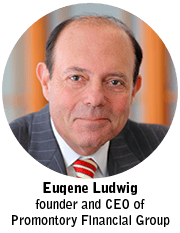
Acquire or Be Acquired Perspectives: One True Thing About Banking and Finance

 This is the third in a five-part series that examines the bank M&A market from the perspective of five attendees at Bank Director’s Acquire or Be Acquired conference, which occurred in late January at the Arizona Biltmore resort in Phoenix.
This is the third in a five-part series that examines the bank M&A market from the perspective of five attendees at Bank Director’s Acquire or Be Acquired conference, which occurred in late January at the Arizona Biltmore resort in Phoenix.
Read the perspectives of other industry leaders:
John Asbury, president and CEO of Union Bankshares
Gary Bronstein, a partner at Kilpatrick Townsend & Stockton LLP
Kirk Wycoff, managing partner of Patriot Financial Partners, L.P.
If you have seen as many cycles in the bank industry as Eugene Ludwig, founder and CEO of Promontory Financial Group and a former comptroller of the currency, you know the time to be most vigilant is not when things seem bleak, but instead when things seems brilliant.
“The one thing I’m certain of is that the good times may go on for a year, two years, five years, seven years, but they will not go on forever,” says Ludwig. “Those folks that continue to be disciplined…will make it through good times and have advantages in bad times. Those that are imprudent will be gone.”
Ludwig made this point while attending Bank Director’s most recent Acquire or Be Acquired conference held earlier this year at the Arizona Biltmore resort in Phoenix. Ludwig’s perspective on banking and the M&A landscape is one of five that Bank Director has solicited from attendees at the annual conference.
“We’re obviously in good times,” says Ludwig. “The general spirit of the community banking session I popped into was upbeat and optimistic. Also, as Marshall McLuhan said, ‘The message is in the medium.’ The medium here is the size of the audience—1,100 people. Audiences tend to slim out in tough times. Having said that, I think people are sober about the challenges the banking industry faces.”
When Ludwig talks about the challenges banks confront, the first thing he talks about is technology, “both accepting new technologies and being able to utilize them effectively on one hand and also not losing customers to new entrants in the marketplace on the other hand.”
One upside for community banks, says Ludwig, is that they seem to be less vulnerable than regional and money center banks to the threat posed by the largest technology companies with the deepest pockets.
“I think Amazon and Google most likely will be more threatening to the mid- and large-sized institutions than the small ones—though still very threatening because the consumer loan business, where they will focus, is fundamentally not a community bank business or even a particularly regional bank business,” says Ludwig. “That’s a big bank business or specialty lender business.”
The same is true on the liability side of the balance sheet, says Ludwig. “The heart of community banking is core deposits and deposit-taking. As a big commercial entity, it’s still perhaps less likely that Amazon is able to get a bank charter with access to deposit insurance so it’s at a disadvantage in terms of core deposits and having a full suite of banking services the way banks do. If Amazon does get a charter, or the equivalent, then the community bank still—at least for a time—has community feel and touch and personal ties that will prove highly beneficial to it compared to other deposit gatherers.”
In addition to technology, discussions about the state of the M&A market obviously loomed large at this year’s Acquire or Be Acquired conference. Ludwig agrees with other industry observers who have characterized the current M&A activity as lukewarm.
“It is one of those promises of things to come that for a long time hasn’t come,” says Ludwig. “There is of course M&A activity, but there has been a belief among some that there would be an explosion in activity and that hasn’t happened.”
Ludwig’s comments echo those of fellow conference attendee Kirk Wycoff, managing partner of Patriot Financial Partners, a private equity firm based in Philadelphia. An average of 4 percent of banks enter into mergers or acquisitions each year, notes Wycoff in an interview with Bank Director. There is variation from year to year, but it tends to be on the margin and the absolute number of transactions should trend lower as the industry consolidates.
Ludwig points to two reasons for what seems to be the recent and modest lull in M&A activity. First, with bank valuations at their highest level in a decade, deals continue to look expensive in many parts of the country. And on a more granular basis, Ludwig notes “there is less differentiation among valuations within the industry than one would expect” given the differences among bank franchises. “Having said that, every now and then, this can also produce profound opportunity because individual institutions hit air pockets or run out of management gas,” he says. “So there are definite opportunities in the marketplace.”
The thing to watch in this regard is the quality of a bank’s deposit franchise. “If you run bank valuations in the community banking sector, and I’ve owned a couple in my time, it’s all about the deposits,” says Ludwig.
“I think that we’re getting into an era where deposit funding will be at a premium,” Ludwig continues. “When we started Promontory Interfinancial Network in 2001, banks were crying for deposits, [unlike] the last few years. (Editor’s note: Ludwig was one of Promontory Interfinancial Network’s founders and currently serves as chairman of the board, although the companies operate independently. Ludwig sold Promontory Financial Group to IBM Corp. in 2016 and continues as its CEO.) It may not go back to that, but it could. One thing true of banking and finance is that it’s cyclical. As Mark Twain said: ‘History may not repeat itself, but it rhymes.’”



